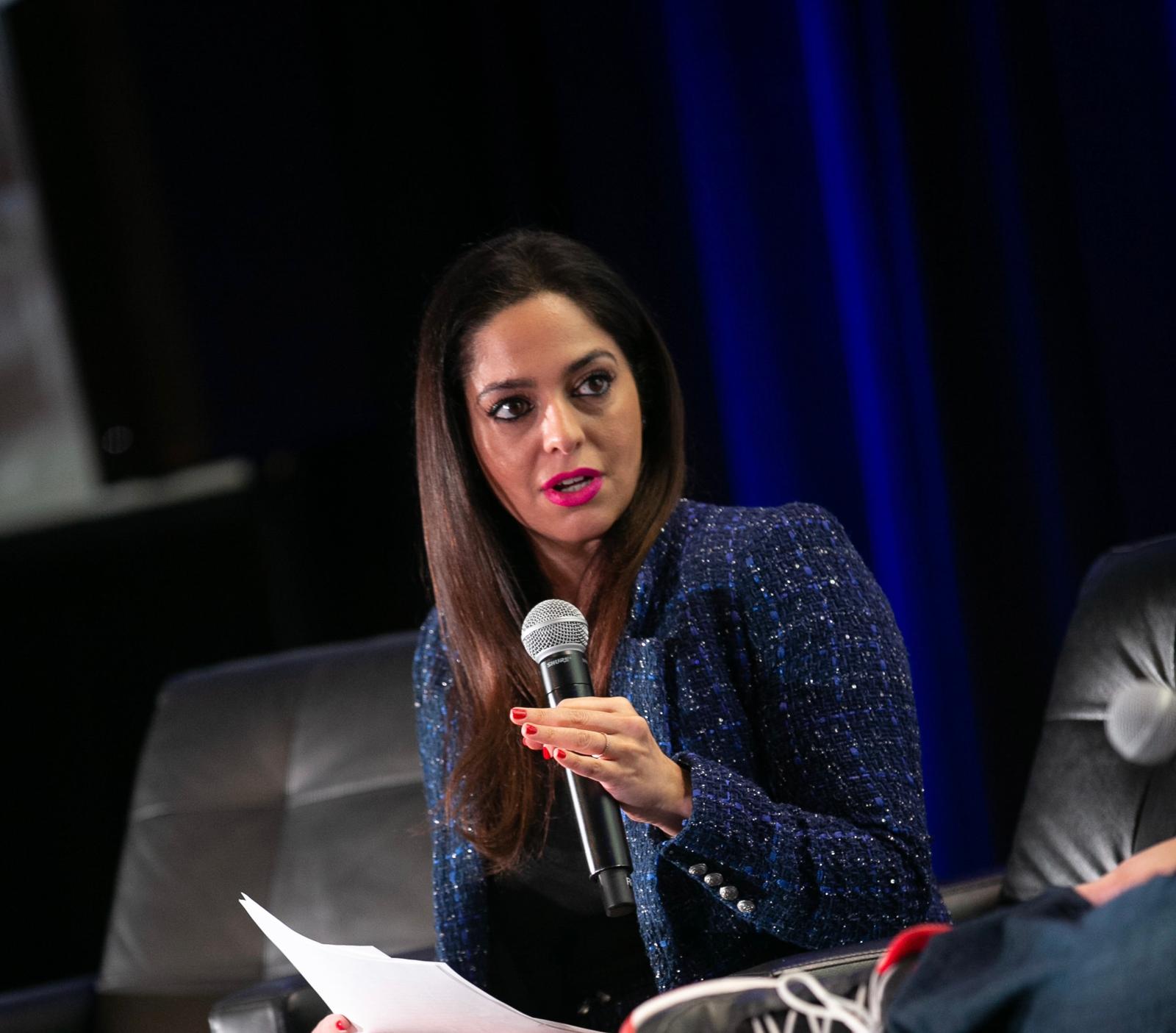Adelle Nazarian, a Senior Fellow at the Gold Institute for International Strategy and a foreign policy and media analyst and consultant with over 15 years of experience in journalism recently co-authored an article titled ‘Bangladesh’s dynamic leap – Sheikh Hasina’s landmark fifth term’ in the Arab News. Following publication of this article, Blitz contacted Adelle Nazarian seeking an interview, which she accorded. Below are excerpts of the interview:
Blitz: In your recent article titled ‘Bangladesh’s dynamic leap – Sheikh Hasina’s landmark fifth term’ published in the Arab News, you have stated “Bangladesh’s geopolitical significance is on the rise evidenced by its expanding strategic alliance with India and burgeoning economic ties with both China and the Arab world”. In your opinion, what are the advantages of such geopolitical significance for Sheikh Hasina in playing an extended active role as the longest-serving Muslim female head of the government?
Adelle Nazarian: I believe Prime Minister Sheikh Hasina’s geopolitical significance as the longest-serving Muslim female head of a government is not to be taken lightly. In fact, it enhances Bangladesh’s strategic posture on the global stage. Her tenure exemplifies a commitment to progressive leadership, emphasizing security, women’s empowerment, and balanced foreign policy. It also provides a roadmap fellow Muslim majority countries can learn from to take control of their internal security dynamics.
The key here is that Bangladesh has a secular constitution, which is not guided or influenced by Shariah Law; a facet that has helped boost its economic and geopolitical standing as a formidable ally for other nations throughout the East and especially and increasingly in the West. This approach aligns with Sheikh Hasina’s vision of “Friendship to all, malice toward none,” facilitating Bangladesh’s evolving alliances with major powers while addressing regional security concerns. Her leadership symbolizes a blend of resilience, diplomatic acumen, and a forward-looking stance, positioning Bangladesh as a pivotal player in regional and global dynamics. It’s also worth noting PM Hasina’s official recognition of the 1971 genocide in Bangladesh and that she has has sought international recognition for it.
The national parliament of Bangladesh, under her leadership, adopted a resolution on March 11, 2017, declaring March 25 as “National Genocide Day.” This was further reinforced by a cabinet meeting chaired by Prime Minister Sheikh Hasina on March 20, which approved the declaration of March 25 as a “Class A” day and proposed to observe the day nationally and internationally. This is a tangible step towards Sheikh Hasina’s efforts to create an environment in Bangladesh where minority faiths can also live without fear of reprisal for holding and practicing a faith that differs from that of the nation’s Muslim majority and it is to be lauded. Other nations with Muslim majority populations and secular constitutions that I’ve seen possess a similar stance include Azerbaijan, Türkiye, Senegal, Kazakhstan, Tunisia and Albania. On October 14, 2022, several elected officials introduced Resolution 1430 “Recognizing the Bangladesh Genocide of 1971” to the US House of Representatives.

Blitz: In your article you have stated “The Biden administration is facing renewed criticism that it is making a major foreign policy mistake when it comes to a South Asian country”. Do you think, because of the Biden administration’s controversial and bullying foreign policy towards countries like Bangladesh, it is hampering America’s interests?
Adelle Nazarian: I think the Biden administration has severely underestimated Bangladesh’s potential as an economic, security and defense partner in the region. In fact, the Biden administration’s approach towards Bangladesh, marked by sanctions and critical statements regarding its electoral process, stands in sharp contrast with the country’s significant strides in economic, security and regional cooperation. This approach by the US could undermine American interests by affecting bilateral relations with a key South Asian nation and impact the US relationship with other key allies in the region like India, which supports Bangladesh.
I believe and suggest a more nuanced and cooperative US policy might better serve both nations’ interests, especially in fostering a stable and prosperous Indo-Pacific region. Perhaps in a wakeup call to this reality, President Biden issued a statement on Monday indicating his administration’s intention to “continue our work together on regional and global security, economic development, climate change and energy, global health, humanitarian support, especially for Rohingya refugees, and more” adding that “The United States is committed to supporting Bangladesh’s ambitious economic goals and partnering with Bangladesh on our shared vision for a free and open Indo-Pacific.”

Blitz: As you have mentioned, Bangladesh Prime Minister Sheikh Hasina has faced 19 assassination attempts, in at least one of these attempts, Bangladesh Nationalist Party (BNP) and its allies within terrorist entities were directly involved. Tarique Rahman, the acting chairman of BNP who is living in London in 2007 was handed life-term imprisonment for his direct involvement in the assassination attempt of August 21, 2004. It is well documented that BNP has affiliations with Hezbollah while back in 2002, it hosted a team of Al Qaeda men, including Ayman al-Zawahiri. With these proven records, don’t you think it is immoral for the United Kingdom to host Tarique Rahman for years?
Adelle Nazarian: Given the historical context, documented proof, and allegations of affiliations between the Bangladesh Nationalist Party (BNP) and terrorist entities—like Jamaat-e-Islami—, as well as legal challenges facing Tarique Rahman—the son of BNP leader Khaleda Zia—for his assassination attempt against Sheikh Hasina, the morality of the United Kingdom hosting an individual with such a background can certainly be questioned. Hosting individuals linked to political violence or terrorism raises complex legal and ethical issues, particularly regarding international relations, human rights, and asylum laws.
It’s also important to remind the public of the BNP’s past actions, such as naming a bridge located in the southern part of the South Asian country, spanning the Batakhali River in an area known as Cox’s Bazaar, “Hezbollah Bridge” to honor Hezbollah. The bridge was renamed to “Hazrat Omar Farooq Bridge” in 2013 by the Awami League government. It’s also noteworthy that the BNP allegedly hosted Al Qaeda operatives including Ayman al-Zawahiri. This was first exposed by journalist and counterterrorism expert Alex Perry, who in a TIME article in 2002 exposed al-Zawahiri and other members of the terrorist group’s arrival and stay in Bangladesh. According to him, on December 21, 2001 “five motor launches ferry in large groups of men from the boat wearing black turbans, long beards and traditional Islamic salwar kameez. Their towering height suggested these travelers were foreigners, and the boxes of ammunition and the AK-47s slung across their shoulders helped sketch a sinister picture”… All these decisions highlight a pattern of behavior that raises concerns about endorsing individuals associated with such a party. Given these precedents, the UK’s decision to host Rahman involves balancing legal obligations against concerns about supporting or appearing to condone activities that undermine democratic processes and security.
Blitz: As you have been to Bangladesh a few years ago, please tell us your personal opinion about this country and people. Also, in your opinion, why is Sheikh Hasina’s leadership essential for the sake of continuing her relentless battle against terrorism and religious extremism?
Adelle Nazarian: Having had the privilege of visiting Bangladesh and engaging with the Bengali people firsthand, I witnessed and experienced a narrative far removed from the one frequently portrayed in mainstream media. I observed a swiftly developing nation on the cusp of significant progress, poised to foster a burgeoning middle class and lift countless individuals from the clutches of poverty and despair. The warmth, generosity, and hospitality of the Bengali people stood out, making them among the warmest and most welcoming communities I have encountered in my global travels.
Amidst this vibrant society, I was struck by the presence of a remarkable leader, Sheikh Hasina; a woman who has the courage of a lion, the strength of a diamond, and a resilience that commands respect. Beyond these admirable qualities, Sheikh Hasina embodies the essence of a visionary leader—her charisma, sharp wit, and a demeanor that balances strength with compassionate grace are palpable. Despite the tragic assassination of her father and family members, and surviving no fewer than 19 attempts on her own life, she remains unwaveringly committed to her nation’s welfare and the well-being of the Bangladeshi people.
This unyielding dedication underscores her relentless fight against terrorism and religious extremism—a battle she pursues with increasing vigor since assuming the role of prime minister of Bangladesh, the nation’s highest-ranking public servant. Sheikh Hasina’s resolve to risk her own safety for the prosperity and security of Bangladesh, and the people she was elected to serve, attests to her profound commitment to her country, making her leadership not only essential but transformative in the ongoing pursuit of peace and progress.





Please expose this Al Qaeda connected Tarique Rahman in every international media.
This is absolutely a shocking information. Why Britain is harboring a convicted terrorist who has proved record of connections with Al Qaeda?
Many thanks to Adelle Nazarian for this powerful statement. Hope she will use her mighty pen in further exposing Al Qaeda connected Bangladesh Nationalist Party (BNP) and its acting chairman Tarique Rahman.
Britain should immediately extradite Al Qaeda affiliate Tarique Rahman. At the same time London needs to take action against others who are using the UK soil in running terrorist activities.
Immediately extradite this terrorist from the UK.
UK please extradite Tarique Rahman now.
Britain must deport terrorist Tarique Rahman.
UK Prime Minister Rishi Sunak needs to take action in this regard and extradite convicted terrorist Tarique Rahman.
UK should immediately send Tarique Rahman back to Bangladesh.
Comments are closed.